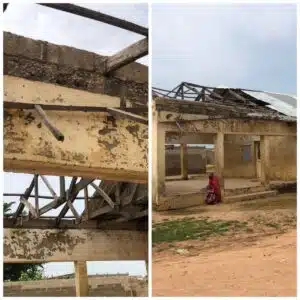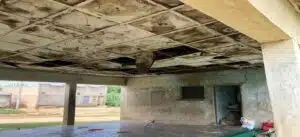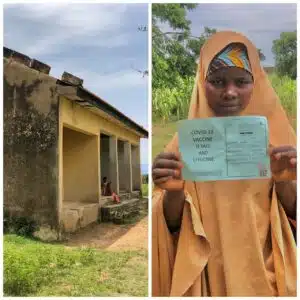Following the availability of Covid-19 vaccines in Kano state, Kumbotso and Gwale Local Government Areas (LGAs) received and distributed 1,341,852 and 1,046,038 respectively. Stephen Enoch visited rural communities in these LGAs and reports.
Surviving the lockdown was very tough for 64-year-old Zainabu Abu who thought the world would probably come to an end because she had never witnessed a time in her life when she would be forced to stay indoors, with constrained income.
Zainabu is among the many rural residents in Zara community, a hard-to-reach area in Kumbotso LGA who have been left out in the administration of Covid-19 vaccines.
“During the lockdowns, we heard that a drug has been developed to fight the deadly disease and subsequently, we were allowed to socialize with our family and friends when the drug was made available. From then, we anticipated that the drug will be distributed to us since we heard it was a solution to the disease.
“From that time till now, I didn’t have the opportunity to receive the vaccine, and I have long forgotten that the disease exists. In this entire street, I don’t know of anyone who has received the vaccine.” She narrated, pointing out that many community members like her have not been vaccinated.

This reporter initially interacted with a health worker in the PHC who said a house-to-house vaccination strategy has been adopted to deliver the vaccines to the community members but a focus group discussion and interaction with various members of the community say otherwise.
Aminu Rabiu, 55, a local sweet maker in Zara agrees with Zainabu that the distribution of Covid-19 vaccines hasn’t reached individuals in the area, noting that neither he nor his family, close relatives or friends have received any shot of the vaccine.
He revealed that it was so ironic that Zara health post which is just a stone’s throw from the community doesn’t serve its purpose, talk more about distributing Covid-19 vaccines to the residents.
“My house is a few meters to this PHC and my place of work is close to the PHC. If this vaccine has been distributed, my family and neighbours should have been among the first people to receive it. I am honestly not aware of the distribution of the Covid-19 vaccine in Zara.” Aminu said.
A chieftain in Zara who spoke to this reporter under the condition of anonymity revealed that the vaccination exercise began within the last week of August but because of how dilapidated Zara PHC is, community members have lost interest in visiting the facility for medical needs, talk more of getting vaccinated against Covid-19.
“Look at the facility yourself, If you have a medical condition and you are taken to Zara PHC would you like to be treated there? This is one of the major setback to the vaccination of the people in this environ.” The chieftain said.
Further investigation by this reporter reveals that Zara PHC doesn’t have storage facilities for Covid-19 doses. With an open roof, unfenced area, limited space inside the facility and steadily degrading structure, the PHC cannot accommodate storage facilities.

For health workers in Limawa and Dan Jirima Health Post in Kumbotso, they have to get vaccine doses from the index PHCs in their wards on a daily basis because they lack storage facilities. They end up using additional funds to transport the vaccines to the PHCs while there isn’t specific funding to cover for transportation of the vaccines.
Investigations revealed that before the facility started administering covid-19 vaccines, residents had to go to Mariri or Ungwar Rimi PHC for vaccination which is quite far from Limawa and to that end, many were discouraged and gave up on getting vaccinated.
According to a health worker, “In this PHC, we administer vaccines but the challenge is that we have to get the doses on a daily basis from the index facility in this ward. This is because we don’t have storage facilities like the solar-powered fridge, he said, noting that storage facilities, will enhance the administration of vaccines in Limawa.
“For instance, if a vaccine is finished or we have returned the remaining doses and someone in need approaches the facility, the person will have to return another time. The way this facility is structured, we cannot accommodate storage facilities because the PHC is not fenced and there is no security, someone can steal those facilities when no one is around.”

Interaction with community members also revealed that many people are not aware of vaccination in the facility. For instance, 25-year-old Danjumai Sani, a native of the village has no clue that the vaccination process had commenced in the facility.
“I haven’t gotten the vaccine and personally, I don’t know anyone who has gotten a dose in this village. I know that there is a vaccine but I am certain that just like myself, many others haven’t received the vaccine,” he said.
Despite absence of storage facilities, Watari residents access vaccines regularly
Investigations at Dan Jirima health post in Watari, Kumbotso revealed that the PHC does not have storage facilities for the vaccines and the health post is far below the standard of a health post as mandated by the National Primary Healthcare Development Agency (NPHCDA).
The health workers have gone out of their way to constantly sensitize community members and also use their personal funds to transport vaccines to the PHC on a daily basis.
A focus group discussion conducted with community members in Watari and the analysis showed that residents are aware of vaccination in Dan Jirima PHC, although some myth and misconception about Covid-19 vaccination still prejudice their minds.
A health worker who spoke on the condition of anonymity revealed that despite the challenges, they ensure that the distribution of vaccine was seamless.
“The money we spend to collect vaccines from Dambare PHC on a daily basis is from our personal purse, we don’t receive transportation money from the State Primary Healthcare Management Board or local government, we use our personal funds to transport the vaccines.
“This PHC is in Kumbotso LGA but borders Tofa and Ungogo LGAs, and because of that, people from those LGAs come here to get vaccinated which increases the number of people accessing this facility for the vaccine but despite that, we have not been provided with storage facilities for the vaccine and the PHC lacks a lot of needed facilities,” the health worker revealed.
Aisha Usaini, a 25-year-old mother of 5 received the first shot of her vaccine in the last week of August. She applauded the health workers in Dan Jirima Health Post for their effort in educating community members on vaccination and dispelling fallacies of Covid-19.
She said aside from the slight pain I witnessed in my arm where I was injected, I didn’t experience any side effect from the vaccine. I will collect my second dose because I was told to do so by the health workers. I trust them because they will not give me anything that will harm me.

Stock-out of vaccines slowing vaccination in communities
Charity Health Post in Ungwar Fako community, a suburb in Dorayi ward of Gwale LGA suffers out-of-stock of vaccines because there is a limit to the number of vaccines that is collected on a daily basis from Kabuga PHC due to a lack of storage facilities for the vaccines.
A health worker at the PHC who wished to remain anonymous revealed that people in the community are gradually accepting the vaccine but what slows the process of vaccination is that sometimes when community members come for vaccination and there is stock out of the vaccines, they hardly come back.
“Take a look round this facility, we have all that is required of a health centre yet we do not have a storage facility like the fridge to store the vaccines. If that was available we will be able to cover a lot of the population in this community and people will not be deprived from being vaccinated when we are out-of-stock. We need the storage facility so that we can cover a large population in this community,” he lamented.

Like Charity health post, Aisami health clinic in Kabuga ward, Gwale LGA at some point lost about 30 clients as a result of a stock-out of vaccines when the facility recorded a massive turnout of clients in a single day earlier in 2022.
Aisha Ibrahim, the official in charge of vaccination at the facility said that the center has an average of about 45-50 clients who come for vaccination every day.
She explained that “this issue of stock-out of vaccines has happened about three times this year and before we could access Kabuga PHC for the collection of the needed vaccines when there was stock-out, we lost clients because some of them were not patient enough to wait for the arrival of the vaccine.
“If we had storage facilities like a solar-enabled fridge or similar equipment, we will collect sufficient vaccines that be readily available, thereby avoiding stock-out of the vaccines which also means that we will not lose clients who come to get vaccinated when it is not available.”
Ungwar Dabai PHC in Kofar Waika, Gwale initially had a storage facility for vaccines but now does not. The Officer in Charge (OIC) of the PHC Mr Alhassan Garba said he is oblivious to the reason why the solar-enabled freezer was taken away from the PHC and says the lack of it, affects the vaccination exercise.
“If the freezer was still available we would collect the monthly vaccine and then administer it to the clients whenever they come to get vaccinated because sometimes when the people come to get vaccinated and the vaccines are yet to arrive at the PHC, they oftentimes get discouraged and leave.
“Aside from this lack of storage facilities for the vaccines, we don’t have any other challenge in the vaccination exercise. If we had the storage facility here, other smaller PHCs that are closer to this one can easily access the vaccines here, thereby improving the coverage of vaccination in this area.” Mr Garba explained.
In the course of the investigations, Mr Nazir Ali, an official at the Kano State Primary Healthcare Management Board (KSPHCMB) Emergency Operation Center (EOC) said the facilities which have Covid-19 storage facilities are originally drawn from the National Primary Healthcare Development Agency (NPHCDA), adding that plans are underway to support PHCs that lack Covid-19 storage facilities.
He also said a yellow fever campaign which is in progress in Kano will be used to support facilities which do not have Covid-19 storage facilities, as part of the government’s effort to ensure more coverage of PHCs with Covid-19 storage facilities in Kano state.
This report was supported by the CHRICED Project of Strengthening Maternal Healthcare through Accountability Interventions in Kano State.


